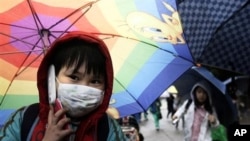Showers on the Korean peninsula prompted some schools to close Thursday. Many parents were worried about exposing children to "radioactive rain." They were not reassured by South Korean authorities, who said there is no risk to children, even if some radioactive particles might be detected in rain water.
Fears about radiation in rain prompted classes to be canceled at some schools in South Korea.
In Gyeonggi province, 125 kindergartens and elementary schools gave students the day off.
A spokesman for the provincial education office, Cho Byung-lae, says all institutions there were asked to curtail outdoor activities, but it was left up to school principals to decide whether to cancel instruction.
Cho says they did not decide to close schools because of radiation, calling that a rather remote risk. But, he explains because there was such strong concern expressed by many parents, school authorities decided to relieve their anxiety.
In Seoul, educators refused to cancel classes and appealed for calm. However, some parents in the capital say they did not send their children to school because of the risk of radiation in the rain.
Other schools in the country dismissed class early or halted outdoor activities, including sporting events.
The South Korean prime minister’s office and other government agencies said, even if the rainfall has traces of radiation, the amount would be too small to raise any health concerns.
Worry grew after South Korea’s Institute of Nuclear Safety reported a small level of radioactive iodine and cesium was detected in rain off Jeju Cheju island, in the southern part of the country.
President Lee Myung-bak asked meanwhile for increased screening of imported food to check radiation levels. During a visit to the country’s Food and Drug Administration, he said people here are bound to be worried because South Korea is so close to Japan. The crippled Fukushima nuclear power plant is 1,000 kilometers east of the Korean peninsula.
South Korea, along with China, has expressed frustration that Japan did not give neighboring countries timely information before its release of radioactive water from the stricken nuclear power plant into the Pacific Ocean. Japan's top government spokesman has apologized for the failure.
The plant, on Japan’s northeastern coast, was hit by the March 11 magnitude 9.0 earthquake and resulting tsunami. The nuclear plant’s operator, Tokyo Electric Power Company, Thursday began pumping nitrogen into one of the most severely damaged reactors, hoping to prevent another explosion of hydrogen gas.





